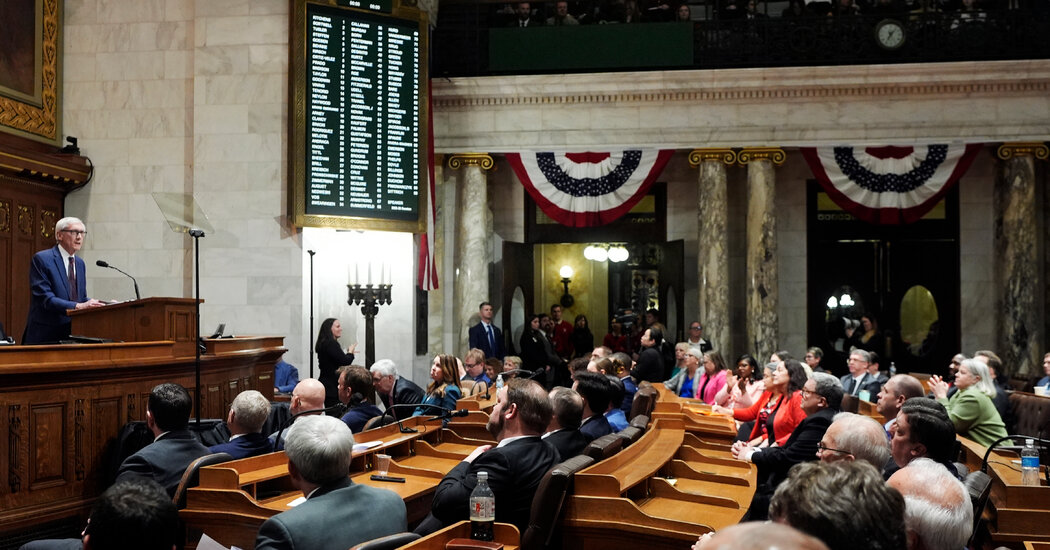As President Trump pushes aggressively to reshape the federal government, Democrats have retreated into a political crouch that reflects their powerlessness in Washington.
Far from rising up in outrage, the opposition party’s lawmakers have taken a muted wait-and-see approach as Mr. Trump tries to end birthright citizenship, halt diversity programs in the federal government, undo foreign policy alliances and seek retribution against his perceived political enemies.
In some cases, Democrats are even making a show of working with Republicans.
Scores of them voted for the Laken Riley Act, which allows the deportation of unauthorized migrants who are accused but not yet convicted of crimes. Others volunteered to work with Republicans on a border security bill. And while Democrats are fighting the nominations of Pete Hegseth as defense secretary and Tulsi Gabbard as national intelligence director, Mr. Trump’s other cabinet appointees appear on a glide path to confirmation without much vocal resistance.
It is telling that in the opening days of the new Trump administration, the loudest pushback to the president’s policies has come not from an elected Democrat but from the bishop at Washington National Cathedral, who asked Mr. Trump directly during a service to have mercy on immigrants and L.G.B.T.Q. children.
“We’re no longer trying to win a news cycle,” said Senator Brian Schatz of Hawaii, a Democrat who has become an outspoken messenger for his party on social media. “We’re trying to win an argument, and that’s going to take time and patience and discipline.”
A group of 70 progressive House Democrats and six Senate Democrats gathered at the Capitol on Thursday to try to settle on a single message of opposition to Mr. Trump as he takes aim at myriad liberal constituencies and priorities. The assembled Democrats concluded that their best course of action was to focus on economic concerns, which they believe led to the party’s November defeats.
Representative Greg Casar, a Texas Democrat who is the chairman of the Congressional Progressive Caucus, convened the meeting. He said Mr. Trump’s control of the federal government, combined with his allies’ ownership of major social media networks, meant that Democrats must be in lock step, with a focused message of opposition for voters.
“It’s going to be really critical for Democrats to point out what Trump’s real intentions are, which is to screw people over on pocketbook issues in service of the mega-rich,” Mr. Casar said.
The Democratic stance is a stark change from the last time Mr. Trump came to office. That period, in 2017, was defined by public demonstrations of resistance, a flurry of new liberal groups and a palpable anger over an election outcome many in the party saw as illegitimate.
This time, Mr. Trump won the popular vote and there have been no murmurs of significant foreign interference in the election. And he has unleashed so many new policies and executive orders that Democrats have been left in a daze.
“It feels like we’re battling the L.A. fires, and the wind is 100 miles per hour, and it’s zero percent contained,” said Matt Bennett, a founder of Third Way, a center-left think tank. “We’re just going to have to wait for the wind to die down a little. It’s going to be a minute before Democrats can mount an effective response.”
Some Democrats do believe Mr. Trump has already made significant mistakes that will cause political damage for him and Republicans.
His far-reaching pardons for people convicted of attacking police officers at the Capitol on Jan. 6, 2021, have already led to uncomfortable responses from Republicans. Democrats are also quick to point out that few of Mr. Trump’s early actions have addressed inflation or grocery prices — top issues for voters that he pledged during the campaign to prioritize.
And in a sign that substantive pushback to Mr. Trump’s policies is likely to come from state capitals rather than from Washington, 22 state attorneys general sued the federal government to block Mr. Trump’s executive order directing the government not to recognize U.S.-born children of unauthorized immigrants as citizens. (However, not all of these left-leaning attorneys general wanted to talk about their legal challenge — in Washington, D.C., the typically voluble top prosecutor did not issue a news release and declined to discuss it.)
In Wisconsin, Gov. Tony Evers, a Democrat, devoted 11 paragraphs in his annual State of the State speech on Wednesday night to defending immigrants’ contributions to Wisconsin — though he did not mention Mr. Trump by name.
“Wisconsin, we cannot allow reckless decisions in Washington to stymie our economic momentum,” Mr. Evers said. “I will not compromise on our Wisconsin values of treating people with kindness, dignity, empathy and respect.”
And in Newark, Mayor Ras J. Baraka on Thursday denounced an immigration raid in which he said a U.S. military veteran was detained.
“Newark will not stand by idly while people are being unlawfully terrorized,” Mr. Baraka said.
Democratic officials whose constituents are being directly targeted by Mr. Trump’s actions are less willing to give the party time to think about how to respond.
Cristóbal Alex, a former Biden administration official who is now the chairman of the Latino Victory Fund, ticked through Mr. Trump’s early moves: binding himself to billionaire tech executives, ending Biden-mandated caps on insulin prices, pardoning the Jan. 6 rioters and seeking to end birthright citizenship.
“It’s prime time for Democrats to step it up,” Mr. Alex said.
And yet plenty of Democrats want to make it known that they are trying to work with the new Trump administration. Thirteen Democratic senators signed a letter to Senator John Thune of South Dakota, the Republican majority leader, asking to be involved in Mr. Trump’s proposed legislation to crack down on the nation’s immigration system.
“We stand ready to work with you,” the senators wrote.
Some Democratic officials ascribed the party’s hesitation and confusion in part to a lack of clarity from their voters.
While anger — and money — drove the so-called Resistance of 2017, Mr. Trump’s second coming has been met by liberal resignation. No one in the world of politics or culture has emerged with a cogent and consistent anti-Trump message since his victory over former Vice President Kamala Harris, and the social media platforms that hosted many of the influencers of eight years ago are now owned by Mr. Trump’s billionaire allies.
Patrick Gaspard, the president of the Center for American Progress, a liberal research group, said the lack of Democratic mobilization was not surprising, given that few in the party were shocked by Mr. Trump’s 2024 victory. Democrats, he said, must take time to decide how best to oppose him and Republicans.
“This guy is throwing loads of chum in the water, and we can’t go after all of it,” Mr. Gaspard said.
One think tank’s thoughtfulness is another’s hesitation. Rahna Epting, the executive director of MoveOn, a liberal advocacy group, said elected Democrats were trying to determine what their voters want them to do.
“I see Democrats still trying to figure out where to plant their feet on the spectrum of pure opposition and bipartisanship,” Ms. Epting said. “It’s up to constituents and outside groups like MoveOn and others to hold their feet to the fire.”





